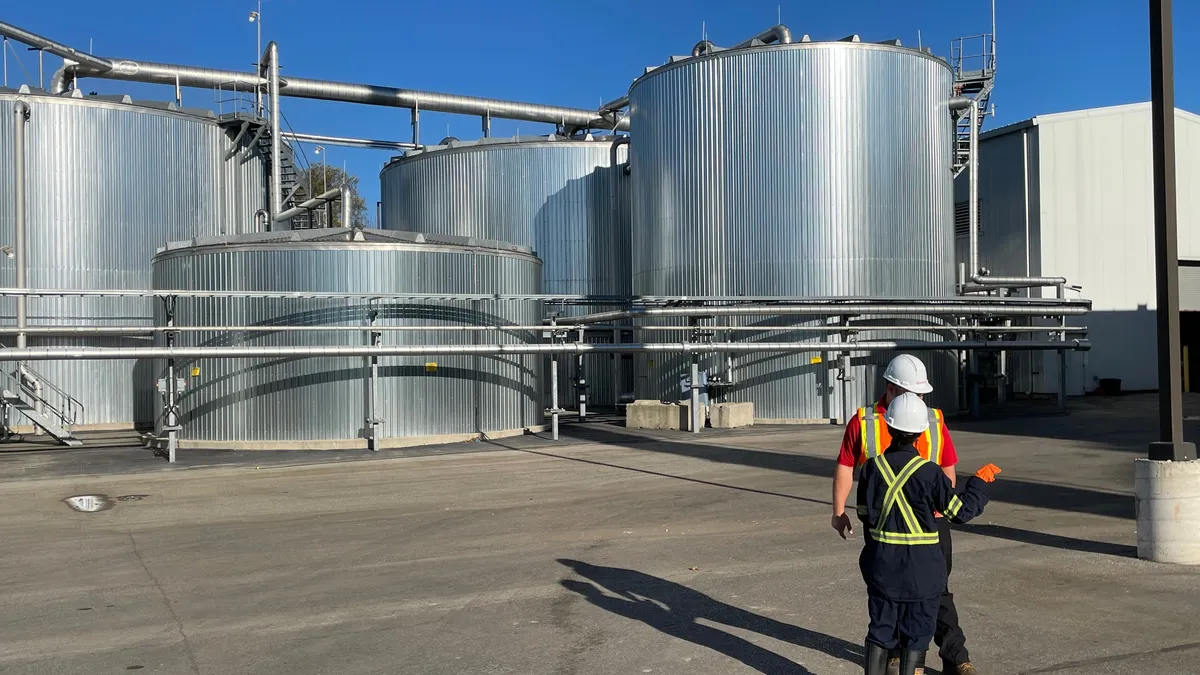Dive Brief:
- Veolia North America’s Canadian division has been awarded a contract to operate an anaerobic digestion facility in Toronto. The company already operates Toronto’s other digestion facility, known as the Disco Road Organics Processing Facility.
- The Dufferin Organics Processing Facility was upgraded in 2021 to provide additional capacity for Toronto's green bin organics collection system. The facility can now process 55,000 metric tons of organics per year.
- Veolia Canada also operates a publicly owned in-vessel composting operation in Montreal and an anaerobic digestion facility in Edmonton, Alberta. It's in the process of commissioning another digester for the city of Montreal.
Dive Insight:
Canada's federal government has targeted organics as a waste diversion priority, and it released finer details on the country's progress in April.
In 2022, Canada diverted more than 3 million metric tons of organic waste from landfills, down 3% compared to 2020, according to the progress report. Residents were responsible for more than three-quarters of organic materials sent to composting facilities, with 65% of households reporting that they diverted kitchen waste.
Canada's largest city, Toronto, began its green bin program in 2002. The source-separated curbside organics collection program ramped up over several years, reaching all single-family residences in 2006, and it now requires multi-residential buildings to divert organic waste as well. Today, Toronto reports collecting about 170,000 metric tons of organics annually.
The city's digesters were developed to manage that waste. The Dufferin facility originally opened in 2002 as a pilot project, BioCycle reported. Its initial processing capacity was 25,000 metric tons annually.
The facility was most recently operated through a contract with W.S. Nicholls, with Ontario-based Anaergia serving as the subcontractor handling operations and maintenance. The contract was to expand the facility, after which the contractor could operate the facility for three years with two optional one-year extensions. Toronto’s general manager of solid waste management services opted to seek a new operator for the facility.
During the expansion of the facility, built by Nicholls and Anaergia, the project partners installed a wastewater treatment system, expanded an odor control system, expanded the tipping floor and made other enhancements. Anaergia also supplied its proprietary technology to the facility, including its OREX organics extrusion process which is also used in facilities in California and elsewhere. The Dufferin facility was also upgraded to begin refining biogas into renewable natural gas, which is injected into the grid through a partnership with Enbridge. The facility's digestate is composted, according to the city.
The Disco Road facility was completed in 2014 to offer expanded processing capacity. It’s operated by Veolia in partnership with technology provider CCI BioEnergy. The facility manages 75,000 metric tons of organics annually and was upgraded in 2024 to produce renewable natural gas.
Earlier this year, Veolia announced its GreenUp strategy, which envisions a broad-based expansion of the company’s services in North America. The expansion includes new work to decarbonize and depollute waste processes on behalf of Veolia’s clients, as well as capture and “regenerate” resources like water for reuse. Veolia estimates that the two organics processing facilities help Toronto reduce its greenhouse gas emissions by 22,000 metric tons per year.
“Veolia Canada is proud to continue collaborating with the City of Toronto on a shared vision for addressing the environmental challenge of managing organic waste safely and sustainably,” Veolia Canada CEO and Country Director Denis Chesseron said in a statement. “Our resources and expertise in managing anaerobic digestion operations are driven by Veolia’s GreenUp strategy for growth and sustainability, ensuring a cleaner world for future generations.”















